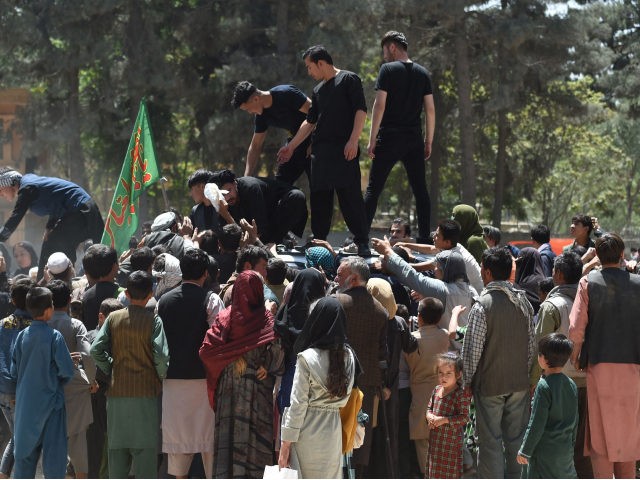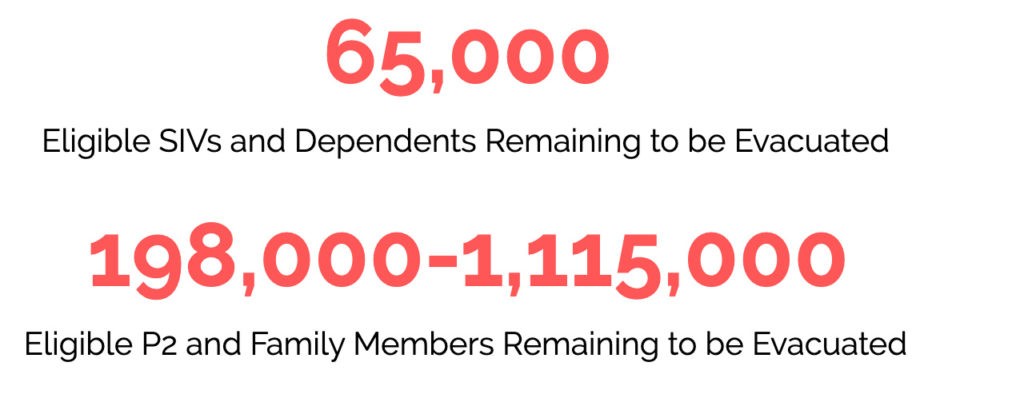Immigration advocates are urging the government to import 1.2 million Afghan immigrants into the United States, even as President Joe Biden’s deputies are rushing to pack roughly 100,000 Afghans into the pipeline by August 31.
The New York Times reported August 25:
At least 250,000 Afghans who may be eligible for expedited American visas remain in Afghanistan, far too many for American forces to rescue before their deadline to leave next week, new estimates suggest.
…
These estimates are based on reports on Afghan employment published annually by the Department of Defense and analyzed by the Association of Wartime Allies, a group that advocates for Afghans affiliated with the U.S., and researchers at American University. Other estimates vary widely, from 100,000 to more than 300,000 people.
The group estimated that the number could be far higher, depending on the assumptions used: More than a million Afghans who remain in the country, it found, could be eligible for expedited immigration status.
On its website, the Association of Wartime Allies group suggests a goal of roughly 1.2 million:
The group is run by Kim Staffieri and Matt Zeller, who is affiliated with the liberal-run Truman National Security Project, which works with progressive groups that want to further expand migration.
The group’s current goal of 1.2 million is equal to one Afghan refugee for every three U.S. children born in 2020 — or 20 times the number recently suggested by President Joe Biden.
“The estimate we’re giving is somewhere between 50,000 and 65,000 folks total, counting their families,” Biden told ABC News anchor George Stephanopoulos on August 19.
On August 26, Biden showed little enthusiasm for importing additional Afghans, telling a White House press conference:
Millions of Afghani citizens who are not Taliban, who did not actively cooperate with us … if given a chance, they’d be on board a plane tomorrow. It sounds ridiculous, but the vast majority of people in communities like that want to come to America if given a choice. So, getting every single person out can’t be guaranteed for anybody because there is a [official] determination of all who want to get out … It’s a process.
The progressive push for more Afghan migrants is happening even as Biden’s Department of Homeland Security continues to extract migrants across the Mexican border for use in the U.S. economy as consumers, workers, and renters. The border inflow will likely exceed 800,000 in 2021, including illegals who sneak across the border, and perhaps 500,000 job-seeking migrants.
This southern inflow is in addition to the inflow of legal immigrants — about 730,000 — and also the inflow of visa workers, such as H-1B foreign graduates.
The total 2021 inflow of migrants is on track to deliver almost 1.6 million people into Americans’ society, or roughly one migrant for every two American births in 2020.
The government’s economic policy of extraction migration inflates the nation’s labor supply and boosts consumer spending, so aiding companies and investors. The migration is deeply unpopular because it damages ordinary Americans’ career opportunities, cuts their wages, raises their rents, curbs their productivity, shrinks their political clout, widens regional wealth gaps, and wrecks their democratic, equality-promoting civic culture.
Yet many progressives insist on importing more migrants, even after the U.S. quits Afghanistan on August 31. “We should bring as many as possible here,” said New York Times op-ed writer Michelle Goldberg on August 16:
Canada, which is about one-ninth the size of the United States, has announced its intention to take more than 20,000 fleeing Afghans. There is no way to justify America accepting fewer on a per capita basis; 180,000 should be the absolute floor.
This is likely to be unpopular; polls showed a majority of Americans opposed the comparatively tiny Syrian refugee resettlement program. But there is no moral argument against vastly expanded refugee admissions.
The mass migration would be unpopular. For example, 52 percent of Americans oppose the resettlement of more than 50,000 Afghans in the United States, according to a survey by Rasmussen Reports. Only 26 percent favor an inflow of more than 50,000, according to the August 18-19 survey of 1,000 likely voters.
For many years, a wide variety of pollsters have shown deep and broad opposition to labor migration and the inflow of temporary contract workers into jobs sought by young U.S. graduates. This public opposition is multiracial, cross-sex, non-racist, class-based, bipartisan, rational, persistent, and recognizes the solidarity Americans owe to each other.


COMMENTS
Please let us know if you're having issues with commenting.